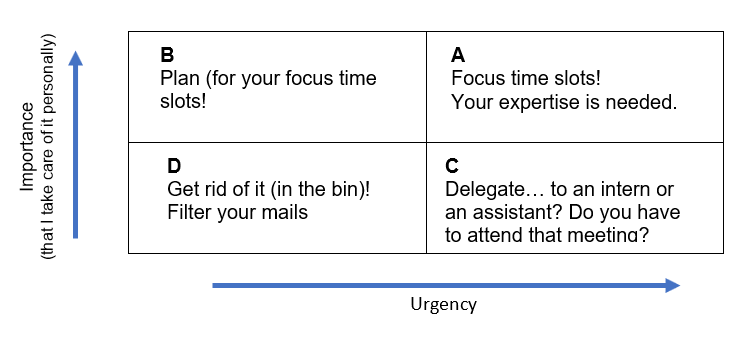Whitney’s leadership podcast
… alle Podcasts findet ihr u.a. auf den folgenden Plattformen:
… alle Podcasts findet ihr u.a. auf den folgenden Plattformen:
Have you ever wondered at the end of a long workday what you have REALLY achieved? Maybe you’ve crossed a lot of “important” stuff off your to-do-list, but there is still a nagging sense that you didn’t make any real progress?
If that is the case, then I pose the question: What is REALLY important to you? What do you want to achieve and what are you doing on a daily basis to move towards these goals?
In this video, I’ll share one of my favorite time management tools with you: High-Value Activities. In terms of time management, it’s not about squeezing even more into your day, it’s about deciding on what’s really important and focusing on these activities. It’s also about identifying activities that have no or little value and learning how to reduce or eliminate them. This tool was something I discovered in the middle of the first Covid-19 Lockdown in March 2020 when my work changed dramatically. Everything seemed “urgent” and “important” and needed to be taken care of immediately.
This method has helped me enormously to regain focus and stay aligned with my short-, mid-, and long-term goals
What an honor to talk to Dr. DanTomasulo, the author of “Learned Hopefulness: The Power of Positivity to Overcome Depression”. His book is incredibly inspiring and is designed to help anyone struggling with depression or perhaps simply feeling overwhelmed in life to find a way out.
He defines “Hopefulness” as a verb – meaning that we shouldn’t just sit back and wait for things to get better or not. Sitting back and just waiting is fate. Hopefulness requires proactive behavior: What can I DO to make a change? This book is loaded with tools and techniques to make that change. You don’t need to be a coach, psychologist, or neuroscientist to understand how to use these techniques. This book is written “for the man on the street”, and he makes it possible for anyone to help themselves. Although – as a coach and expert in the fields of positive psychology and resiliency – this book is a must for anyone helping someone else make the changes they want to have in their lives. In this interview, “Dr. Dan” talks about the power of positivity and positive emotions, the prism approach to gaining a different perspective on the situations, the importance of making positive emotional deposits, the hierarchy of hope, and some of the most recent research on depression and optimism that has stemmed from the Covid-19 pandemic.
If you’re interested in boosting the positivity and optimism in your life, this video provides you with ten ways to do so. This videoblog shows you how to spark your overall positivity in your life by focusing on the 10 forms of positive emotions (as researched by Dr. Barbara Fredrickson and explained in her book “Positivity”). In this video I explain what these ten emotions are and provide concrete examples of each one.
By focusing on these ten positive emotions you remain the driver of your bus in charge of the happiness and positivity you let into your life. You decide who and what you let on or off of your bus. You are at the wheel of your bus (a.k.a. your life) and you spark the positivity in your life – which then spreads to those around you.
If you want to stay at the wheel of your bus, then tune in and find out how …..
How can I …
… boost the creativity and innovative thinking in my team?
… increase the number of engaged employees in my organization?
… decrease the number of disengaged employees?
… decrease the number of sick days in my team?
… lower the fluctuation in my team? A lot of people are leaving.
Psychologists say that the most prevalent disease sweeping across the workplace start with an M: Multi-tasking. A study released by McKinsey* showed that jobs that were done by multi-tasking had twice the number of mistakes than those tasks done by single-tasking, and these tasks took on average 30% longer than single-tasking approaches.
Further studies show that the people who regularly do things by multi-tasking are impacted health-wise. It leads to high blood pressure, headaches, migraines, backaches, stomach aches and increases tension and stress. And when we are stressed we cannot think clearly. Permanent stress reduces our ability to make clear decisions, because permanent levels of stress, which are induced by multi-tasking, we have adrenaline and cortisol streaming through our body the whole time. And when this is the case, our field of vision drops to about 15% – 20%. This impacts not only what we see, but how well we can think and look at options and in the end, make decisions. When we are relaxed and focused on single tasks, our field of vision – how much we can see and how much we can think (creatively) – goes up to 75%.
15% or 75%? I’ll take 75% any day. Single-tasking is the antidote to multi-taking.
Many people believe that multi-tasking is heroic and makes them strong.
It is not; it’s counter-productive.
Here are a couple of tips to reduce multi-tasking:

Get out there and have a great week! Focus on reducing multi-tasking and on improving singe-tasking. It may mean making difficult decisions. And yes, every decision has consequences. What can you focus on? What can you do less of, so you can do more of the things which are important to you?
If you would like coaching support in this area, please get in touch with me: whitney@whitneybreer.com.